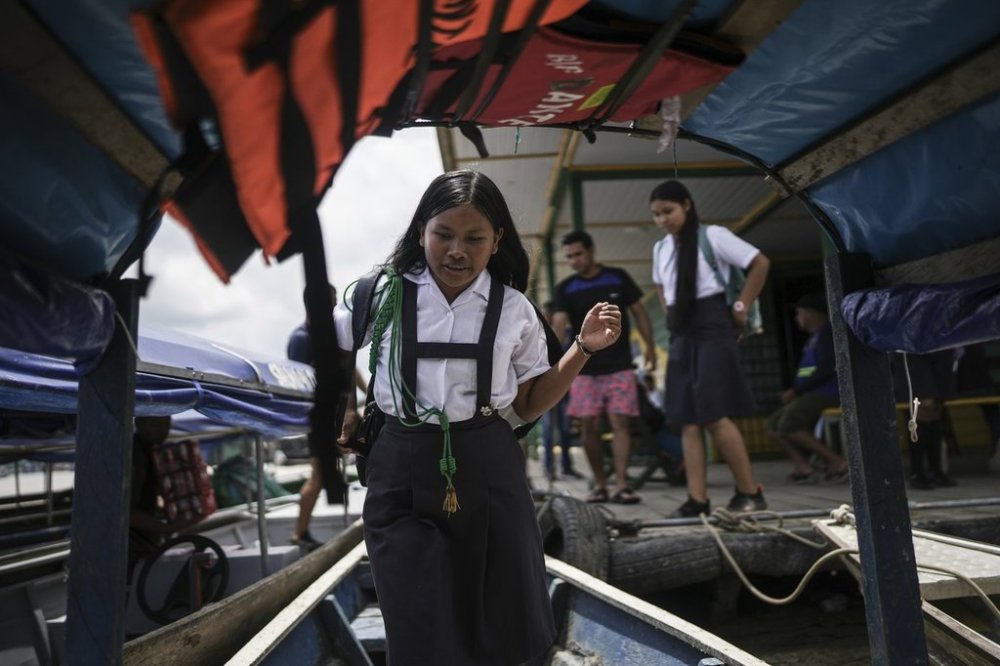Daily life on a remote Amazon island goes on despite diplomatic dispute
Advertisement
Read this article for free:
or
Already have an account? Log in here »
To continue reading, please subscribe:
Monthly Digital Subscription
$0 for the first 4 weeks*
- Enjoy unlimited reading on winnipegfreepress.com
- Read the E-Edition, our digital replica newspaper
- Access News Break, our award-winning app
- Play interactive puzzles
*No charge for 4 weeks then price increases to the regular rate of $19.95 plus GST every four weeks. Offer available to new and qualified returning subscribers only. Cancel any time.
Monthly Digital Subscription
$4.99/week*
- Enjoy unlimited reading on winnipegfreepress.com
- Read the E-Edition, our digital replica newspaper
- Access News Break, our award-winning app
- Play interactive puzzles
*Billed as $19.95 plus GST every four weeks. Cancel any time.
To continue reading, please subscribe:
Add Free Press access to your Brandon Sun subscription for only an additional
$1 for the first 4 weeks*
*Your next subscription payment will increase by $1.00 and you will be charged $16.99 plus GST for four weeks. After four weeks, your payment will increase to $23.99 plus GST every four weeks.
Read unlimited articles for free today:
or
Already have an account? Log in here »
SANTA ROSA, Peru (AP) — Rain or shine, every weekday from March to December, boat owner Salvador Mitidieri ferries students from the shore of the Amazon River in Brazil to the only primary school in miles on Santa Rosa — a remote island that is now the subject of a territorial dispute between Peru and Colombia.
Mitidieri’s daily job is just one example of how the diplomatic quarrel between the two South American neighbors over the island has had little effect on the life of its roughly 3,000 residents.
Peru maintains it owns Santa Rosa Island based on treaties about a century old, but Colombia disputes that ownership because the island had not yet emerged from the Amazon River at the time.

Despite the ongoing exchange of words between government officials, life in Santa Rosa continues undisturbed. Residents identify as Peruvians, but coexist peacefully with their Colombian and Brazilian neighbors, and often rely on those countries for basic needs.
Named after a 16th-century saint, Santa Rosa has no running water or sewage system. People cross the river to cities in Colombia or Brazil to see a doctor, but children from those places come here to attend school.
“People from Colombia, Peru and Brazil live normally,” said Melany Mejía, a 17-year-old Peruvian who lives in Tabatinga, Brazil, but attends middle school in Santa Rosa. “The merchants, the tourists, the people, everyone treats each other with good spirits,” she said.
Upon finishing high school in December, Mejía hopes to become a nursing assistant. She’s still considering her options, which include attending school in either Leticia, Colombia; Tabatinga, Brazil or Iquitos, Peru, a 16-hour boat ride from her home in Santa Rosa.
Mitidieri, the boat operator, begins his workday on the Tabatinga dock in Brazil, waiting to ferry students to Santa Rosa’s sole primary school, identified only by the number “601014.”
The students, all of whom are either Peruvian or born to Peruvian parents in Tabatinga, take the 10-minute boat ride to attend the school where all classes are taught in Spanish.
“I feel calm here, working with my colleagues. We all know each other,” said Mitidieri, 36, referring to his foreign neighbors. He said he believes the local relationships have nothing to do with the dispute between countries and that leaders like Colombian President Gustavo Petro simply don’t know the reality in the Amazon.
“Maybe the children I bring will one day be doctors, lawyers, police officers,” he said, steering his boat, as dozens of other small vessels crossed the Amazon River in different directions.
____
Follow AP’s coverage of Latin America and the Caribbean at https://apnews.com/hub/latin-america

